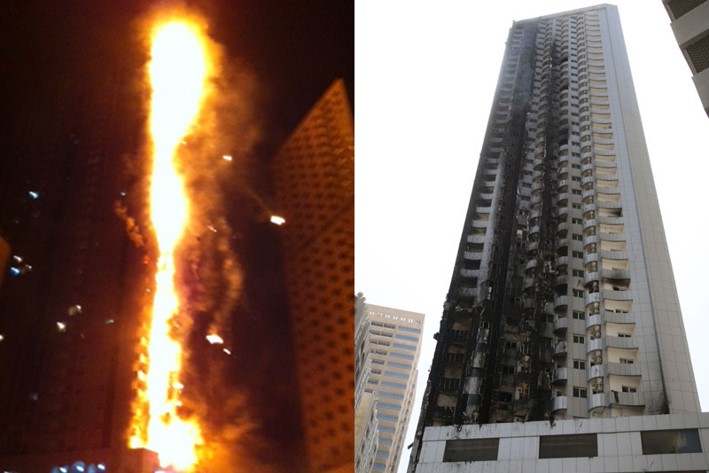Façades
In the last decades, several tall-buildings consisting of innovative external wall systems have been involved in disastrous fire events.
The use of new products and systems including combustible materials as external walls represents a fire hazard in the built environment. This is essentially due to the lack of understanding and characterisation of the fire performance of these products, as well as methodologies and tools to assess their intrinsic fire hazard.
At present many existing buildings have combustible façade systems for example including Aluminium Composite Panels made of two aluminium sheets bonded with a low density plastic core, or insulation materials.
UQ Fire research projects on façades include:
'Material Library of Cladding Materials'
The University of Queensland, in collaboration with the Non-Conforming Building Products (NCBP) Audit Taskforce in the State of Queensland (Australia), has proposed a framework to provide a robust methodology to assess the fire hazard of cladding materials in existing buildings based on a thorough understanding of the relevant fire phenomena. To enable this, a comprehensive material library with relevant fire performance criteria to assist the fire safety engineering community is being developed. The methodology is not intended to determine if any specific façade design is safe. It is intended to provide the data necessary for a competent fire safety engineer to conduct the analysis necessary to determine the safety of a façade system corresponding to a specific set of materials, a specific configuration and a specific building context. The methodology developed to build the Material Library consists of two testing protocols: a screening testing protocol that enables a quick testing turnout and quick identification of the product type, and a detailed testing protocol that enables the fire performance of the material to be characterised. The screening testing protocol aims at a material identification and assessment of the thermal decomposition, which is to be applied to every cladding material. The detailed testing protocol aims at characterising the heat of combustion, ignition, burning behaviour and flame spread of particular selected materials, thus delivering all the data necessary for a fire safety engineering to conduct a comprehensive assessment. Cross-referencing data from both protocol will allow a comprehensive characterisation of a wide range of materials.
'Experimental study on the interaction of cladding materials in the fire performance of facades ' recently completed in 2018 by Brendan Garvey (BE-ME).
'Fire performance of ACP facade systems' recently completed in 2017 by Joshua Ogilvie (BE-ME).
'Predicting the Fire Performance of Aluminium Composite Panels (ACP) Systems in External Walls' led by Adeline P Teo (PhD).
This research project aims at providing building designers, fire engineers and building authorities with a methodology to better understand the fire properties and performance of the ACP panels. An increased knowledge in the performance of ACP panels (i.e. material and system properties and failure mechanisms) will benefit the fire engineering community and the building industry as a whole.

